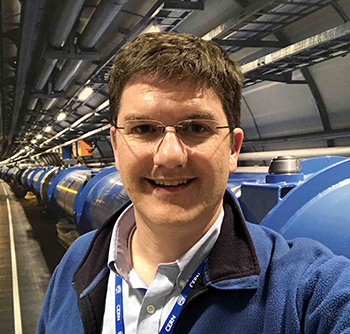Campus News
Steven Ritz stepping down after 10 years as director of particle physics institute
Jason Nielsen, professor of physics, will take over as director of the Santa Cruz Institute for Particle Physics (SCIPP) in the new year.


Physics Professor Steven Ritz is stepping down as director of the Santa Cruz Institute for Particle Physics (SCIPP) after ten years at the helm. Physics Professor Jason Nielsen, who has served as associate director of SCIPP for the past eight years, will replace Ritz as director starting January 1, 2021.
“Now is an excellent time to do it. It’s been ten years, SCIPP is very strong, and Jason has been great as associate director, so this was an easy decision,” Ritz said. “I want to have more time to do physics, interact with students, and expand efforts related to diversity, equity, and inclusion.”
Established in 1980, SCIPP is an interdisciplinary research unit focusing on experimental, theoretical, and computational aspects of particle physics, astrophysics, and cosmology. SCIPP scientists, including faculty in the Departments of Physics and Astronomy & Astrophysics, play leading roles in experimental, observational, and theoretical research in these areas.
Ritz is currently serving as project scientist for the Rubin Observatory LSST Camera, which will be the largest digital camera ever constructed, with more than 3 billion pixels of solid-state detectors. The Vera C. Rubin Observatory, now under construction in Chile, will conduct the 10-year Legacy Survey of Space and Time (LSST), collecting vast amounts of data to address major scientific questions in astronomy, cosmology, and particle physics.
Ritz has also been very active in NASA’s Fermi Gamma-ray Space Telescope, a highly successful project that involved SCIPP in many aspects of its design, development, and research. Ritz served in a variety of roles in the Fermi mission, including project scientist.
Other major astrophysics projects involving SCIPP scientists include the gamma-ray observatories VERITAS and CTA, and the Dark Energy Survey (DES) and the Dark Energy Spectroscopic Instrument (DESI), both of which are large international collaborations in optical astronomy.
“That’s been a big change for SCIPP, growing from gamma rays to optical surveys, using different techniques and different ways of addressing scientifically interesting questions in astrophysics, cosmology, and particle physics. I’m very happy about that transition,” Ritz said.
SCIPP also continues to play a major role in the ATLAS experiment at the Large Hadron Collider (LHC) in Switzerland, where scientists famously confirmed the existence of the Higgs boson in 2012. UCSC physicists have been at the forefront of U.S. participation in the LHC and the ATLAS collaboration, making important theoretical and experimental contributions to the largest ongoing project in particle physics worldwide.
SCIPP is recognized as a world leader in the development of custom electronics and silicon sensors for state-of-the-art particle detection systems, and SCIPP physicists have been working on ATLAS, the larger of two general purpose detectors at the LHC, since 1994.
Nielsen has been deeply involved in the ATLAS project and currently serves on the management advisory committee for the U.S. ATLAS organization. His research focuses on the physics of the Higgs boson, and his group is currently involved in precision measurements of its interactions with other particles.
Meanwhile, SCIPP is gearing up for a major upgrade of the ATLAS experiment that will be installed around 2025.
“We’re calling it an upgrade, but some parts are being replaced completely, so our clean room at SCIPP is buzzing now as we prepare to enter the production phase for the silicon detectors,” Nielsen said. “We’re looking forward to all the opportunities for doing great science in the future, with new experiments coming online not only in collider physics, but also in astrophysics and the large survey projects we’re involved in.”
SCIPP has long had a reputation in the physics community for innovative science and a collaborative atmosphere. Ritz credits founding director Abe Seiden for building a strong culture of collaboration at SCIPP, which he has sought to maintain.
Nielsen said he was grateful to Ritz and Seiden for their mentorship, adding, “They set the stage for the way people collaborate and the way SCIPP is seen internationally, so we’re able to attract outstanding people who want to work in this kind of environment.”